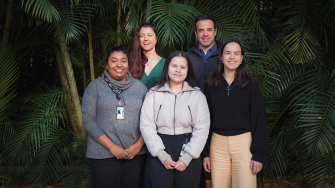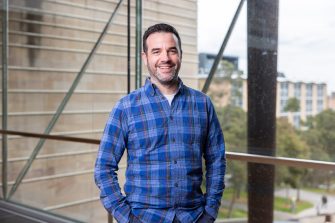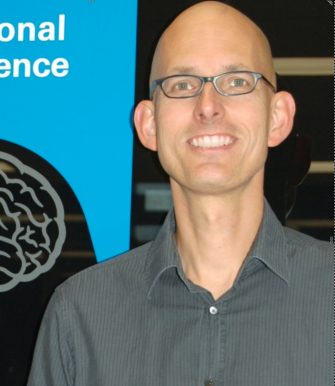
About us
The CNS Gene Therapy Group is interested in the molecular mechanisms of normal and pathological functions of neurons and myelin-forming cells in the central nervous system. Our main focus is on a group of neurological disorders termed leukodystrophies. The word leukodystrophy is of Greek origin and translates into ‘leuko = white’, ‘dys = abnormal’ and ‘troph = growth’. Leukodystrophies are genetic diseases of the brain white matter associated with an early onset and substantial mortality in children. The population incidence is estimated to be one in 7,600 live births and to date there are no effective treatments available. Our aim is to establish targeted gene therapy strategies for leukodystrophies and other neurological disorders.
The first step in understanding these devastating conditions is to establish accurate disease models, which enable us to study the underlying pathophysiology and to explore novel therapeutic approaches. Once established, we leverage these models to develop novel gene therapy strategies. We have a long-standing interest in adeno-associated viruses (AAV) as gene therapy vectors and as tools in basic research.
We are developing the current AAV platform in two directions:
- to achieve widespread and stable gene expression in the CNS following intracranial or systemic delivery; and
- to overcome the inherent neurotropism of AAV for targeting specific CNS cell populations including glia.
Our research group employs state-of-the-art techniques, including behavioural testing, neurogenetics, molecular biology, histology, and neuroimaging to characterise disease models and to assess the therapeutic outcome of gene therapy.
Commencing in 2023, the CNS Gene Therapy Group is supported through two new research grants from the NHMRC and MRFF. This funding will expand the spectrum of neurological diseases investigated by the group to include dementias, specifically globular glial tauopathies, as well as hereditary spastic paraplegias. Employing the refined pre-clinical modelling and gene therapy platforms, developed through the leukodystrophy research program, will help to uncover the pathophysiology underlying these currently incurable conditions and guide the development of tailored treatment strategies.
Team
Projects
- Developing pre-clinical models and gene therapy strategies for the leukodystrophy HBSL with the goal to establish a replicable framework for the treatment of other white matter diseases
- Elucidating the pathophysiology underlying globular glial tauopathies to understand neurodegeneration caused by oligodendroglial dysfunction
- Establish a new gene therapy for the currently untreatable hereditary spastic paraplegia SPG-56 and create a replicable therapeutic framework for the treatment of other forms of hereditary spastic paraplegia
Collaborators
- Lars Ittner and Fabien Delerue, Macquarie University, Australia
- Ernst Wolvetang, University of Queensland, Australia
- Caroline Rae, Neuoscience Research Australia (NeuRA), Australia
- Richard Leventer and Chloe Stutterd, Murdoch Children’s Research Institute (MCRI), Australia
- Leszek Lisowski, Children’s Medical Research Institute (CMRI), Australia
- Shelley Forrest and Gabor Kovacs, University of Toronto, Canada
- Eva-Maria Krämer-Albers, University of Mainz, Germany
- Gajja Salomons and Marisa Mendes, Amsterdam UMC, Netherlands
Grants & funding
- Medical Research Future Fund (MRFF) Stem Cell Therapies Mission (2023 -2025); Moon's Mission: creating a replicable therapeutic framework for hereditary spastic paraplegias ($940,424)
- National Health and Medical Research Council (NHMRC) Ideas Grant (2023 - 2026); Understanding neurodegeneration caused by oligodendroglial dysfunction ($1,025,253)
- National Health and Medical Research Council (NHMRC) Ideas Grant (2021 - 2026); Bionic-array Directed Gene Electrotransfer for Treating Focal Brain Disorders ($1,941,000)
- Medical Research Future Fund (MRFF) Accelerated Research (2019 -2023); Massimo’s Mission – The Leukodystrophy Flagship ($3,000,000)
- European Leukodystrophy Association (ELA)project grant (2019 -2022); Towards preclinical proof-of-concept for HBSL gene therapy ($316,000)
- European Leukodystrophy Association (ELA) pilot grant (2016); Modelling and treatment of the novel leukoencephalopathy HBSL ($69,000)
Students
- Ms. Elizabeth Kalotay (PhD)
- Kwannatee Morey-Hype (Neuroscience Honours)
Recent publications
- Kalotay E, Klugmann M, Housley GD and Fröhlich D (2023) Recessive aminoacyl-tRNA synthetase disorders: Lessons learned from in vivo disease models. Frontiers in Neuroscience 17:1182874.
- Kalotay E, Klugmann M, Housley GD and Fröhlich D (2023) Dominant aminoacyl-tRNA synthetase disorders: Lessons learned from in vivo disease models. Frontiers in Neuroscience 17:1182845.
- Klugmann M, Suchowerska AK, Housley GD, Fröhlich D (2023) Histological and biochemical methods to assess aminoacyl-tRNA synthetase expression in human post-mortem brain tissue. Rare Disease and Orphan Drugs Journal 2:8.
- Fröhlich D, Kalotay E, von Jonquieres G, Bongers A, Lee B, Suchowerska AK, Housley GD and Klugmann M (2022) Dual-function AAV gene therapy reverses late-stage Canavan disease pathology in mice. Frontiers in Molecular Neuroscience 15: 1061257.
- Klugmann M, Kalotay E, Delerue F, Ittner LM, Bongers A, Yu J, Morris MJ, Housley GD and Fröhlich D (2022) Developmental delay and late onset HBSL pathology in hypomorphic Dars1M256L mice. Neurochemical Research 47(7): p. 1972-1984.
- Fröhlich D, Gessler DJ and Klugmann M (2022) Editorial: Myelin Repair: At the Crossing-Lines of Myelin Biology and Gene Therapy. Frontiers in Cellular Neuroscience 16:853742.
- Muthiah A, Housley GD, Klugmann M and Fröhlich D (2021) The Leukodystrophies HBSL and LBSL—Correlates and Distinctions. Frontiers in Cellular Neuroscience 14:626610.
- Fröhlich D, Mendes MI, Kueh AJ, Bongers A, Herold MJ, Salomons GS, Housley GD and Klugmann M (2021) A Hypomorphic Dars1D367Y Model Recapitulates Key Aspects of the Leukodystrophy HBSL. Frontiers in Cellular Neuroscience 14:625879.
- Frühbeis C, Kuo-Elsner WP, Müller C, Barth K, Peris L, Tenzer S, Möbius W, Werner HB, Nave KA, Fröhlich D and Krämer-Albers EM (2020) Oligodendrocytes support axonal transport and maintenance via exosome secretion. PLoS Biology 18(12): e3000621.
- Das A, Fröhlich D, Achanta LB, Rowlands BD, Housley GD, Klugmann M and Rae CD (2020) L-Aspartate, L-ornithine and L-ornithine-L-aspartate (LOLA) and their impact on brain energy metabolism. Neurochemical Research 45(6): 1438-1450.
- Auber M, Fröhlich D, Drechsel O, Karaulanov E and Krämer-Albers EM (2019) Serum-free media supplements carry miRNAs that co-purify with extracellular vesicles. Journal of Extracellular Vesicles 8(1): 1656042.
- Fröhlich D, Suchowerska AK, Voss C, He R, Wolvetang E, von Jonquieres G, Simons C, Fath T, Housley GD and Klugmann M (2018) Expression Pattern of the Aspartyl-tRNA Synthetase DARS in the Human Brain. Frontiers in Molecular Neuroscience 11: 81.
- von Jonquieres G, Spencer ZHT, Rowlands BD, Klugmann CB, Bongers A, Harasta AE, Parley KE, Cederholm J, Teahan O, Pickford R, Delerue F, Ittner LM, Fröhlich D, McLean CA, Don AS, Schneider M, Housley GD, Rae CD and Klugmann M (2018) Uncoupling N-acetylaspartate from brain pathology: implications for Canavan disease gene therapy. Acta Neuropathologica 135(1): 95-113.
- Fröhlich D, Suchowerska AK, Spencer ZH, von Jonquieres G, Klugmann CB, Bongers A, Delerue F, Stefen H, Ittner LM, Fath T, Housley GD, Klugmann M (2017) In vivo characterization of the aspartyl-tRNA synthetase DARS: Homing in on the leukodystrophy HBSL. Neurobiology of Disease 97(Pt A): 24-35.
- von Jonquieres G, Fröhlich D, Klugmann CB, Wen X, Harasta AE, Ramkumar R, Spencer ZH, Housley GD, Klugmann M (2016) Recombinant Human Myelin-Associated Glycoprotein Promoter Drives Selective AAV-Mediated Transgene Expression in Oligodendrocytes. Frontiers in Molecular Neuroscience 9: 13.


